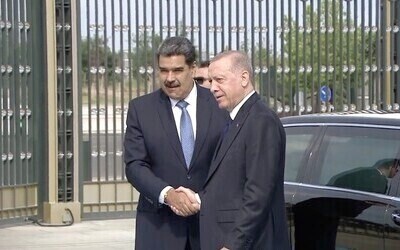Venezuelan Pres. Nicolás Maduro’s (l) June 8 meeting with Turkish Pres. Recep Tayyip Erdoğan (r) in Ankara illustrates Turkey’s alliance with authoritarian and extremist regimes. |
Venezuela’s president met his Iranian counterpart over the weekend in meetings that showcase Iran as a key ally of Venezuela.
He came to Iran after meeting with Turkey’s President Recep Tayyip Erdogan, another key partner for years.
Considering Iran’s uranium enrichment program and continued threat in the Middle East, and Turkey’s threat of a new invasion of Syria and its efforts to keep Finland and Sweden out of NATO, it seems that a Turkey-Iran-Venezuela partnership may be emerging, built on opposition to the US and the West.
What does Turkey want from Venezuela?
Turkey’s president condemned “primitive one-sided” sanctions, according to the Associated Press. “He made the remark while speaking alongside President Nicolas Maduro in a joint news conference,” the report said. Erdogan said he wanted to “reiterate that we will continue to support brotherly Venezuela.”
Turkey sees the thuggish authoritarian regime of Maduro in Caracas as an ally because Ankara has become a key ally of authoritarian and extremist regimes all over the world.
Ankara is undermining NATO and working closely with Russia.
While Ankara preaches “reconciliation” with Israel it also is threatening Greece and threatening to ethnically cleanse Kurds in Syria. Ankara is also undermining NATO and working closely with Russia. All of this points to the reason Ankara wants its Venezuela connection. It wants to maneuver outside the system of countries that work closely with the US.
The AP noted that “Maduro traveled to the Turkish capital just as the foreign minister of Russia, a key ally of the ostracized Latin American regime, was also visiting the city.
The Venezuelan leader is also traveling on his Eurasian tour after he was rebuffed by the US, which decided not to invite him to this month’s Summit of the Americas.
This means that the meetings in Ankara and Tehran are symbolic. Venezuela wants to be the key partner of Turkey and Iran in South America. It has Iranian drones and welcomes trade with Iran, even as the US is trying to keep up sanctions on the Islamic Republic.
“Turkey is one of a handful of places around the world – Russia and Iran are other friendly states – where Maduro is welcome amid US sanctions on his country,” the AP noted.
Meetings with Iran
After Turkey the Venezuelan leader met the President of Iran in Tehran on Saturday. Together they discussed how Iran has always worked with countries that are “independent” of US foreign policy. They claimed to oppose “imperialism,” a usual talking point of Iran and Venezuela.
The two countries slammed US sanctions on Iran. “Sanctions and threats against the Iranian nation have been numerous in these forty years, but the Iranian nation has decided to consider these sanctions as an opportunity for the country’s progress,” an Iranian statement about the meetings noted. Venezuela’s regime also claims success in thwarting US sanctions. The Trump administration sought “maximum pressure” against Iran and also supported opposition voices in Venezuela.
Iran and Venezuela look to sign a 20-year cooperation agreement.
Iran and Venezuela are now looking to sign a 20-year cooperation document that is part of what the two countries see as a strategic agreement. “Cooperation in the field of energy, thermal power plants, repair and overhaul of refineries, export of technical and engineering services, economic, defense and military relations in this government show that there are many fields and capacities in the two countries,” a statement noted.
The Venezuelan president said: “We will use the historical experience of Iran and put technology at the center of the focus of this development cooperation.” “We are witnessing different areas of cooperation between the two countries, and in the fields of energy, oil, gas, refineries and petrochemicals, and in the field of financing through the Iran-Venezuela Relations Development Bank, as well as in the field of defense, through strengthening relations,” the report noted at Tasnim News.
Maduro said that in “the near future, we will see the opening of direct flights from Caracas to Tehran and vice versa, and this issue will be important in tourism development. This way we can develop tourism and our country can be a destination for Iranian tourists.”
Maduro’s arrival in the region is all about messaging and symbolism. Iran and Turkey want to show that they can upstage the US. Venezuela wants to show that even if the Biden administration won’t host its regime, that Caracas is no pariah and can easily meet with Turkey, which is a member of NATO, and also with Iran.
Although Ankara in recent years has drifted away from the West under its current leadership, it continues to maintain relations with western countries.
Hosting Maduro shows Ankara is proud to host rogue regimes to oppose the West.
Hosting the Venezuelan leader shows how Ankara is proud to host rogue regimes and use them to leverage its opposition to the West. This illustrates how Turkey has pivoted away from its claims of reconciliation in 2020 and 2021.
It now looks like it may move back to working with Iran, Venezuela, Russia and other countries that are in opposition to Washington’s policies. The leader’s trip to the region is symbolic because Iran was recently slammed by the IAEA for its nuclear enrichment program. Despite that Venezuela and Iran are illustrating how they can work closely together in the face of sanctions and condemnation.
Seth Frantzman is a Ginsburg-Milstein Writing Fellow at the Middle East Forum and senior Middle East correspondent at The Jerusalem Post.







